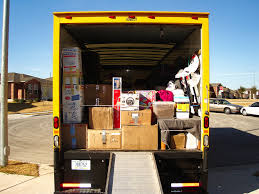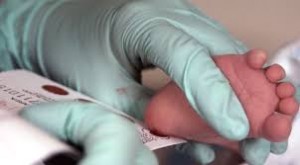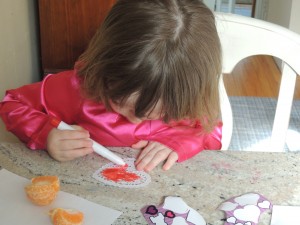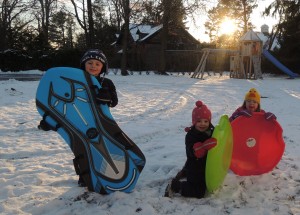Our daughter Penny was born five and a half years ago. She was our first child, and we found out two hours after she was born that she probably had an extra 21st chromosome. For us, the first twenty-four hours were the hardest, although it took me about a year to fully receive her for who she was, without reservation. From the start, I loved her fiercely. When she was in my arms, my fears and doubts dissipated. And yet I still wrestled with questions about her future. I was afraid for her health and afraid for all of us as a family that it would be too difficult to raise a child with special needs. I was worried that we wouldn’t delight in her, that somehow her low muscle tone and developmental delays would cause us to feel frustrated or disappointed. Thankfully, I was wrong.
The feeling I had with Penny in my arms—one of sweetness, peace, joy, and love—that feeling remains. The fears and worries and anger and sadness have disappeared. I don’t mean to say that I never worry about Penny. She’s headed to kindergarten next week, and I’m probably more nervous about it than she is. But my concerns for her are the same as they are for her younger brother and sister. I now understand that Penny can live a full, vibrant, meaningful life, and so I no longer fear what her life will be, even though I can’t predict what will happen.
When Penny was first born, I had two different sets of questions. One set surrounded the practicalities of Down syndrome—how do I find therapists and will insurance cover our expenses and do I need to stop working and what will life look like for us? And then the other set was more spiritual and philosophical in nature—did God create her with Down syndrome and am I supposed to learn something from this experience and in what ways is this going to change me?
. . . I’m a writer, so I’ve written a lot about Down syndrome over the years. These articles might be of particular interest to you:
“Babies Perfect and Imperfect” is an essay I wrote about welcoming Penny into the world and coming to a broader understanding of human perfection and wholeness
“Deciding Not to Screen for Down Syndrome” is an essay I wrote for the NY Times Motherlode blog about my decision not to pursue prenatal testing with my most recent pregnancy and “Is it Harder to Have a Child with Down Syndrome?” is a follow-up post I wrote about the blessings and limitations of having children in general.
I’ve also written a book about our experience. It comes out in the next week or so. It’s called A Good and Perfect Gift: Faith, Expectations, and a Little Girl Named Penny. You can find out more about it at www.amyjuliabecker.com. Oh, and I also write daily for my blog, Thin Places. At least once a week I share a story about Penny and/or disability/Down syndrome there.
Maybe I can leave you with a portrait of who Penny is now. (I always liked hearing about older kids with Down syndrome when Penny was younger—I still do, actually.) Again, Penny is five. She talks to me every day about going to kindergarten. She’s a “little bit nervous” that she will be “lonely” there, but she’s also excited. (She tells me, “The other kids will feel a little bit nervous too.”) She does lots of things that five year olds do: goes to the potty by herself, clears her dishes from the table, tries to entertain her baby sister, and pretends to be much older than she is, “Mom, I’m a do that by myself. Is that cool?” She can write her name and sound out some simple words and count and tell stories. She also has her own limitations and vulnerabilities. She’s very impulsive and we talk a lot about keeping her listening ears on. She has a harder time putting together a jigsaw puzzle than her younger brother. She wears glasses. She still receives speech therapy and occupational therapy and physical therapy.
And Penny—like her younger siblings—can infuriate me. But then she’ll do what she did this morning, which was to come back into the kitchen after breakfast. She tapped me on the arm. “I forgot to say I love you, Mom.” I looked down at her with a smile. “I really love you Mom.” And she walked out of the room.
This is my daughter. I am grateful that she has broken my heart wide open.











